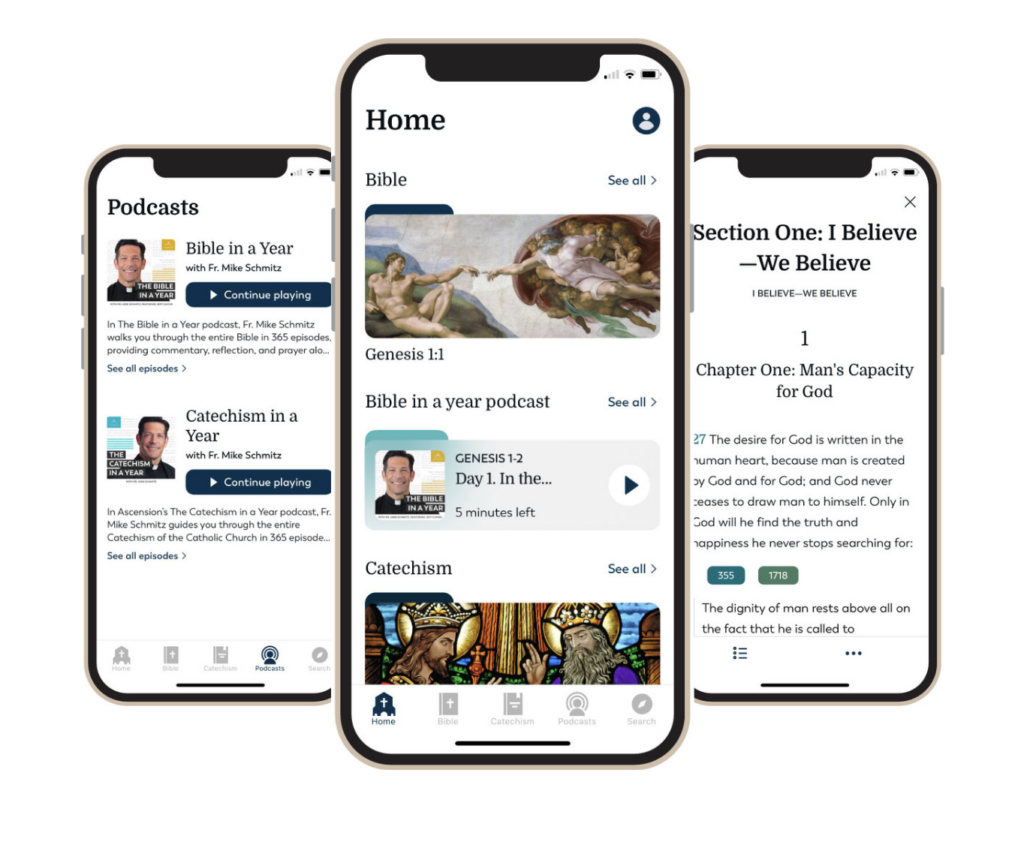When I was little I learned to pray before bedtime:
Now I lay me down to sleep
I pray the Lord my soul to keep
If I should die before I wake
I pray the Lord my soul to take.
God bless Mommy and Daddy and Paulie and Meme and all the people in the world.
As I got older and marched through Catholic grade school I learned the Our Father, the Glory Be, and the Rosary. In my childish zeal I wanted to pray a Rosary but could not stay awake through all the Hail Marys.
As I wandered into adulthood, marriage, and having children, my prayer life suffered from sophomoric effort and limited attention. There was just so much to do! By the time I lay down and attempted prayer, it was too late and I fell asleep.
Good, Better, and Great Prayer
I enjoyed weekly Mass and put the time to good use prayer-wise. One Lent I committed to attending Eucharistic Adoration every Friday for an hour and mostly stayed awake. I taught my kids to pray before bed—not using the foreboding prayer I’d recited but the more optimistic one my husband learned growing up:
Angel of God, my guardian dear
To whom God’s love commits me here
Ever this day be at my side
To light and guard, to rule and guide.
Better. Not great.
Becoming a Prayer Giant
Then one December, after a particularly grueling year, I read that every family needs a prayer giant. My husband’s family had the benefit of his grandmother who, he said, had “an ‘in’ with God.” I decided I wanted to be the prayer giant for my little family. It was a big goal that, while not insurmountable, required untapped effort and unlearned skills. Can I say that all these years later I am a prayer giant? Not sure. What I know is I have learned some stuff about prayer and how glad I am that the Catholic Church offers us such a big toolbox. If I condensed it all down it would be simply this:
If you want to learn to pray or you want to pray better, the best teacher out there is Jesus.
The Mass as Prayer
Jesus will pour out help on you if you ask. Our Lord desires us to be with him. He is constantly calling. He gave us a God-shaped, God-sized hole in our heart that can only be filled by him. To paraphrase St. Augustine, whose mother St. Monica is one of the original prayer giants, our hearts are restless without God. When we invite him into the foyer of our soul, he will fill the whole house. So we ask him for guidance and we trust in his love.
Part of that lesson comes from our Catholic Church. If we open the toolbox we will see the myriad ways we can pray. The Mass is the biggest one of all. It’s one big prayer. We hear God’s message for us in the readings and the Gospel. Then we reflect on them through the homily, and pray for ourselves and others through the petitions. In the second part of the Mass we remember and give thanks for Christ’s suffering and sacrifice so we can be saved and join him in heaven. The Mass has many elements of excellent prayer.

It’s Here: The Bible & Catechism App!
The word of God and the complete teachings of the Catholic Church. Answers and commentary by Fr. Mike Schmitz, Jeff Cavins, and other experts. Video, audio, and textual commentary. Right on your phone.
But Wait, There’s More
In the Catholic Faith we are given lots of prayers. Lots. We can buy books of prayers written by saints and holy people and those are legitimate ways to pray. Sometimes, whether it is because we are sad or stressed or busy, a good way to pray is with other people’s words. We pray them from our heart, making them our own. There are times in prayer when I cannot figure out what it is I am trying to say and I stumble on a prayer written by a priest or sister and it feels like he or she just crawled out of my heart and put the right words down on paper.
The Catholic prayer toolbox contains devotional prayers which can be done throughout the day. Prayed at noon, the Angelus takes two minutes and helps you reorient the day. The Divine Mercy Chaplet is often done at 3 pm using Rosary beads. One can also simply recite “Jesus, I trust in you” three times, followed by:
O blood and water which gushed forth from the heart of Jesus as a fount of mercy for us, I trust in you.
Novenas
Included in the toolbox are novenas. These are what I consider super prayers. A novena can be done for anything. Searching online will yield many different ones. A novena can be done once an hour for nine hours, once a day for nine days or one can pray a flying novena invented by prayer rockstar St. Teresa of Calcutta. A flying novena is ten Memorares. While a novena is nine repetitions of a prayer, St. Teresa taught her sisters to pray a tenth right away in thanksgiving for the answered prayer, so confident was she in the power of the novena.
The Rosary is a beautiful way to pray because the repetition of the Hail Marys quiets us and we can reflect on events from Christ’s life. We don’t need any profound words. It is from the heart and Jesus centered.
The Our Father is the perfect prayer, taught to us by Jesus himself. It contains all the elements of a great prayer: praise (hallowed be thy name), petition (give us this day our daily bread), and request for forgiveness. It can be prayed deeply and slowly reflecting on each line.
Using Our Own Words
We can also pray using our own words whether they are eloquent or messy. Prayer is conversation. Even though God already knows what is on our minds and hearts, he asks us to pray, to put it into words as best we can, to turn to him intentionally and offer it all up. The prayers of saints are beautiful. They often capture just what we want to say and in times of great sadness or even joy, they help us connect with God. But to God, our stumbling efforts are just as beautiful. A loving father does not toss out the art of his child, he proudly displays it on the refrigerator. The pictures my children drew in grade school are far more valuable to me than the Norberto I bought in Assisi.
In the end it comes down to connecting with the One we love who loves us even more. We are messy and imperfect and he adores us. There are times when rote prayer is all we can muster. There are times when we chat with Jesus as we would an old friend and there are times when we fall on our knees in silence and we just exist in his presence. All of it is beautiful.
Did you know Ascension’s App contains the entire Bible, complete Catechism, daily readings, homilies, and many amazing ways to pray? Download it here!
You May Also Like:
Forming a Habit of Prayer [CFRs video]
How Being Thirsty Will Deepen Your Prayer Life
How to Pray Like Mary [Book]
About Merridith Frediani

Merridith Frediani’s perfect day includes prayer, writing, unrushed morning coffee, reading, tending to dahlias, and playing Sheepshead with her husband and three teenagers. She loves leading small faith groups for moms and looking for God in the silly and ordinary. She blogs and writes for her local Catholic Herald in Milwaukee.
Featured photo by Jack Sharp on Unsplash






The reasons why it is irrational to support water baptism is a must for salvation and that one must go through the process of faith, repentance and water baptism in order to be regenerate:
First, if salvation can only be possible unless one has to go through faith, repentance and water baptism, why did the Apostles believe (John 2:11) and repent (John 15:14-15) and yet did not receive water baptism and yet were regenerate? As the Apostles were regenerate without water baptism but the receiving of the Spirit in John 20:22, it implies salvation is not by water baptism but whether any has been baptized by the Spirit.
Second, if salvation can only be possible unless one has to go through faith, repentance and water baptism, why did Acts 4:31-33, “(mention)..when they had prayed..and..were all filled with the Holy Ghost..and great grace was upon them all.” without any to receive water baptism?
Third, if salvation can only be possible through water baptism, why did Acts 8:13, “(mention)..Simon.. believed..and..was baptized..”and yet Acts 8:18, “(mentions)..when Simon saw that through laying on of the apostles’ hands the Holy Ghost was given, he offered them money..”? Instead, he needed not to offer them money if water baptism in Acts 8:13 can lead him to the receipt of the Spirit. Did he really receive the Spirit after Acts 8:13, “..Simon (had) believed..and..was baptized..”? No, he did not receive it since the phrase, Thou hast neither part nor lot in this matter, in Acts 8:21 implies he did not receive the Spirit despite he believed and was baptize.
Fourth, if salvation can only be possible through water baptism, why does Luke 23:43, “(mention).. Jesus said unto (Luke 23:39, “one of the malefactors”).., Verily I say unto thee, To day shalt thou be with me in paradise.” even though he did not receive water baptism?
Fifth, if salvation can only be possible through water baptism, why does Acts 3:19-20, “(mention) Repent ye therefore, and be converted, that your sins may be blotted out..And he shall send Jesus Christ, which before was preached unto you:” without mentioning that it is a must to receive water baptism in order to be regenerate?
Sixth, as Eph 2:8, “(mentions) For by grace are ye saved..Not of works..”, there is no reason to assume one can be saved by their works through their faith in Christ, repentance of sins and water baptism? Instead, we are saved by Tit 3:5, “..his mercy..” instead of our works. The same is mentioned in Acts 15:11, “(that)..through the grace of the Lord Jesus Christ we shall be saved..” instead of by the work of water baptism.
So true Merridith! I believe in the power of prayer and its power to work wonders in my life. My grandma is still the prayer giant of our family. I try my best to say the rosary with my kids everyday and I think it’s the best mindfulness technique out there!